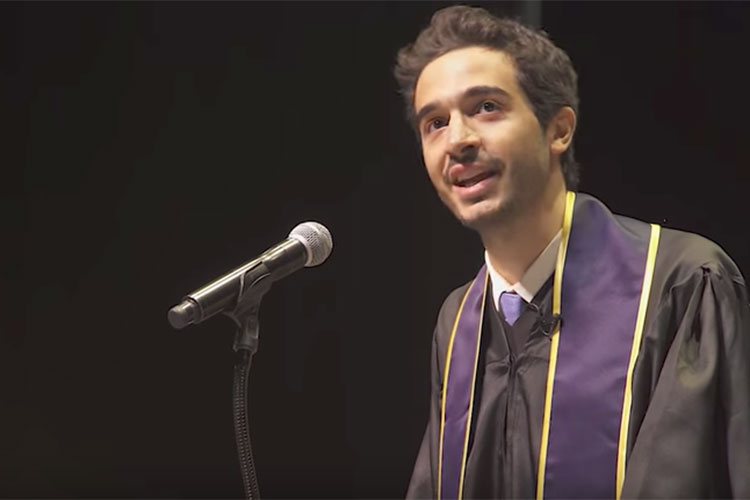Born into Middle East conflict, new graduate goes back to make change
Feras Fahed Abushaar, student speaker at his graduation in International and Area Studies, told his story as part of a strong statement about Berkeley's place as a force for empowering positive change in the world

May 23, 2017
Feras Fahed Abushaar grew up in Kuwait knowing precisely the damage that conflict could cause. Both his Syrian father and Palestinian mother had lost their homelands to war. The family television blared dire news daily, until one day he grabbed the remote and changed the station.
That moment becomes a powerful symbol for his life going forward — seizing opportunity and helping bring about change. As the student speaker at the International and Area Studies graduation last week, Abushaar told that story as part of a strong statement about UC Berkeley’s place as a force for empowering positive change in the world.
At Berkeley, he majored in political economy and did course work in law and economics at the London School of Economics. For the IAS graduation ceremony in Zellerbach Hall, Abushaar talked about how his early life powered his determination to build bridges of understanding among people and affect social transformation in the world, and how Berkeley helped him to realize the opportunity that lay within him.
Among his work while at Berkeley, he spearheaded an initiative with the United Nations High Commissioner for Refugees that supported 23 Syrian refugee families for a year as part of the UNHCR’s “Lifeline Campaign.” He also was a youth leader of the Queen Rania Foundation’s Madrasati (“My School”) Initiative, Kuwait chapter, helping raise over $1 million toward renovating schools and promoting the educational empowerment of children in Palestine.
Since graduating, Abushaar has headed back to Kuwait to keep his work going. “I hope to focus my humanitarian work on developing educational opportunities for refugees and helping them lead sustainable and fulfilling lives with borderless ambition despite the borders and constraints they face, at a time when our world most needs them to fulfill their potential,” he has said.
Abushaar’s time at Berkeley changed him “in more ways than I can express,” he says. In his video, he explains just how: